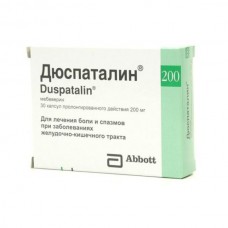Expiration date: 06/2026
Composition and form of issue:
Long-acting capsules. 1 capsule contains:
mebeverine hydrochloride 200 mg
excipients: magnesium stearate-13, 1 mg copolymer of methacrylic acid-10, 4 mg talc-4, 9 mg hypromellose-0, 1 mg copolymer of methacrylic and ethacrylic acids-15, 2 mg glycerol triacetate-2, 9 mg
hard gelatin capsule: gelatin-74, 2 mg titanium dioxide (E171) - 1, 8 mg
blistere in 10 PCs. in cardboard pack 2 or 3 blisters.
Description of dosage form:
Hard gelatin capsules ?1, opaque, white color with marking: on the capsule body - "245", on the capsule cover — " S "and"7". The contents of capsules — white or almost white granules.
Pharmacokinetics:
When ingested, it is subjected to presystemic hydrolysis and is not detected in plasma. It is metabolized in the liver to veratric acid and mebeverine alcohol. It is excreted mainly by the kidneys in the form of metabolites, in small quantities-with bile. Mebeverine capsules have long-term release properties. Even after repeated administration there is no significant cumulation.
Description of pharmacological action:
Spasmolytic myotropic action, has a direct effect on the smooth muscles of the gastrointestinal tract (mainly large intestine). Eliminates spasm without affecting normal intestinal peristalsis. Does not have anticholinergic effect.
Indications:
In adults:
- spasm of the digestive tract (including due to organic disease)
- intestinal and biliary colic
- irritable bowel syndrome.
In children over 12 years:
- functional disorders of the gastrointestinal tract, accompanied by abdominal pain.
Contraindications:
Hypersensitivity to any component of the drug.
Use during pregnancy and breast-feeding:
Teratogenic effect was not found in animal experiments. When prescribing the drug during pregnancy, it is necessary to correlate the benefit to the mother and the potential risk to the fetus. In therapeutic doses, mebeverine does not penetrate into breast milk, so it can be used during breastfeeding.
Side effect:
Rarely-dizziness, extremely rarely-urticaria, angioedema, swelling of the face and exanthema.
Dosage and administration:
Inside, 20 minutes before eating, without chewing and drinking water-200 mg 2 times a day (morning and evening).
Overdose:
Symptoms: increased excitability of the Central nervous system (theoretically).
Treatment: gastric lavage, symptomatic therapy. The specific antidote is unknown.
Special instruction:
During treatment, caution should be exercised when driving and during activities potentially dangerous activities that require increased concentration and speed of psychomotor reactions.


